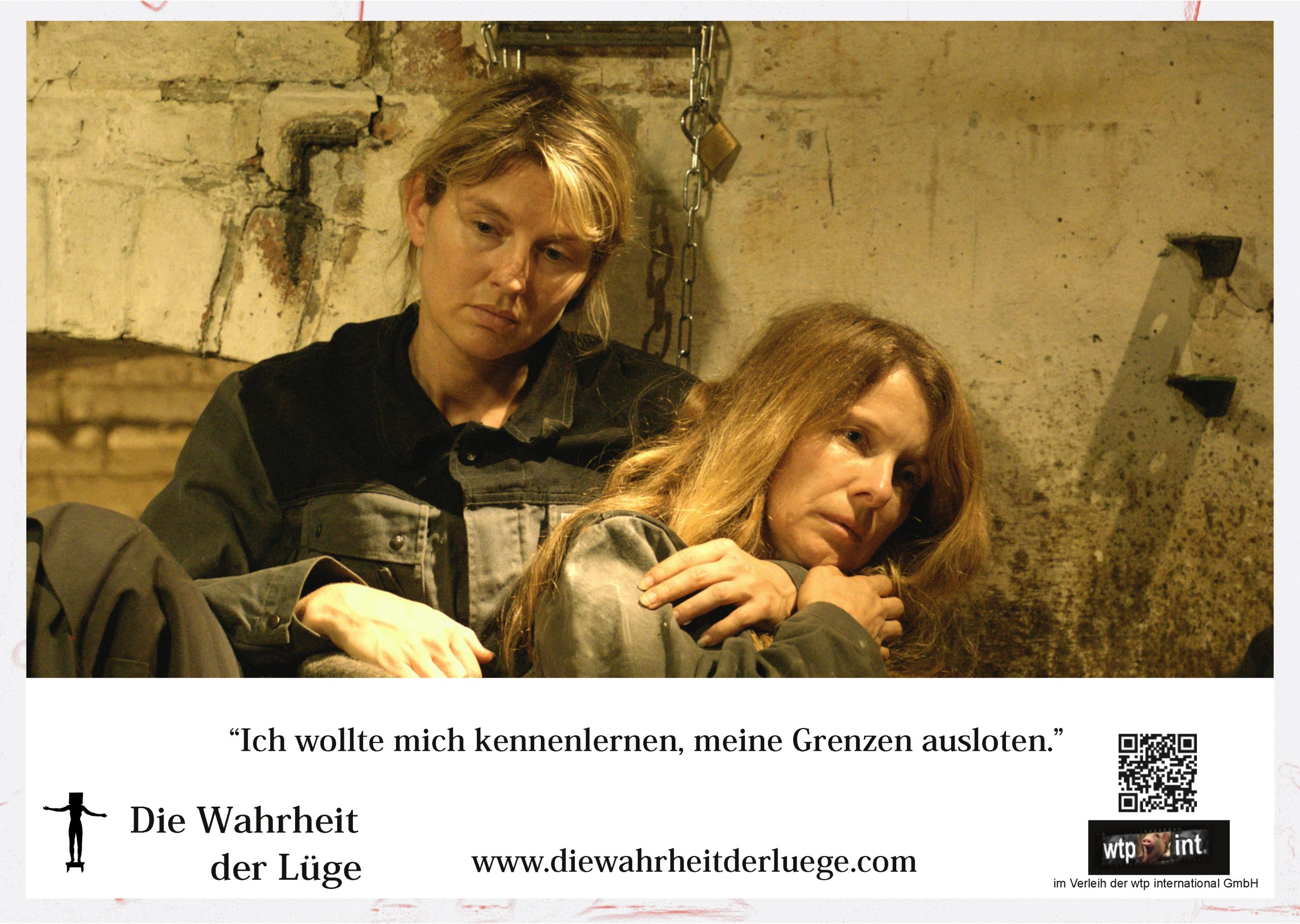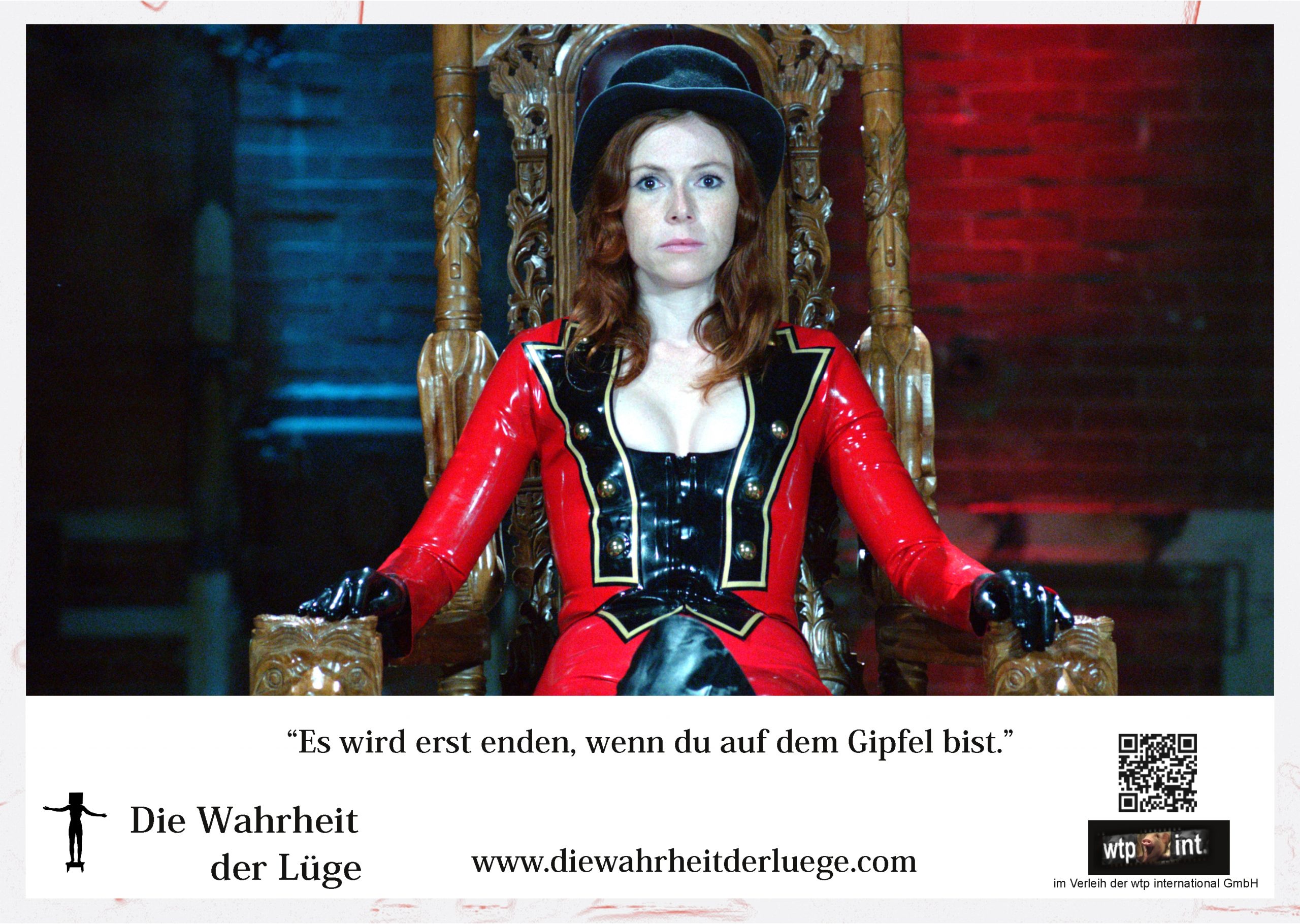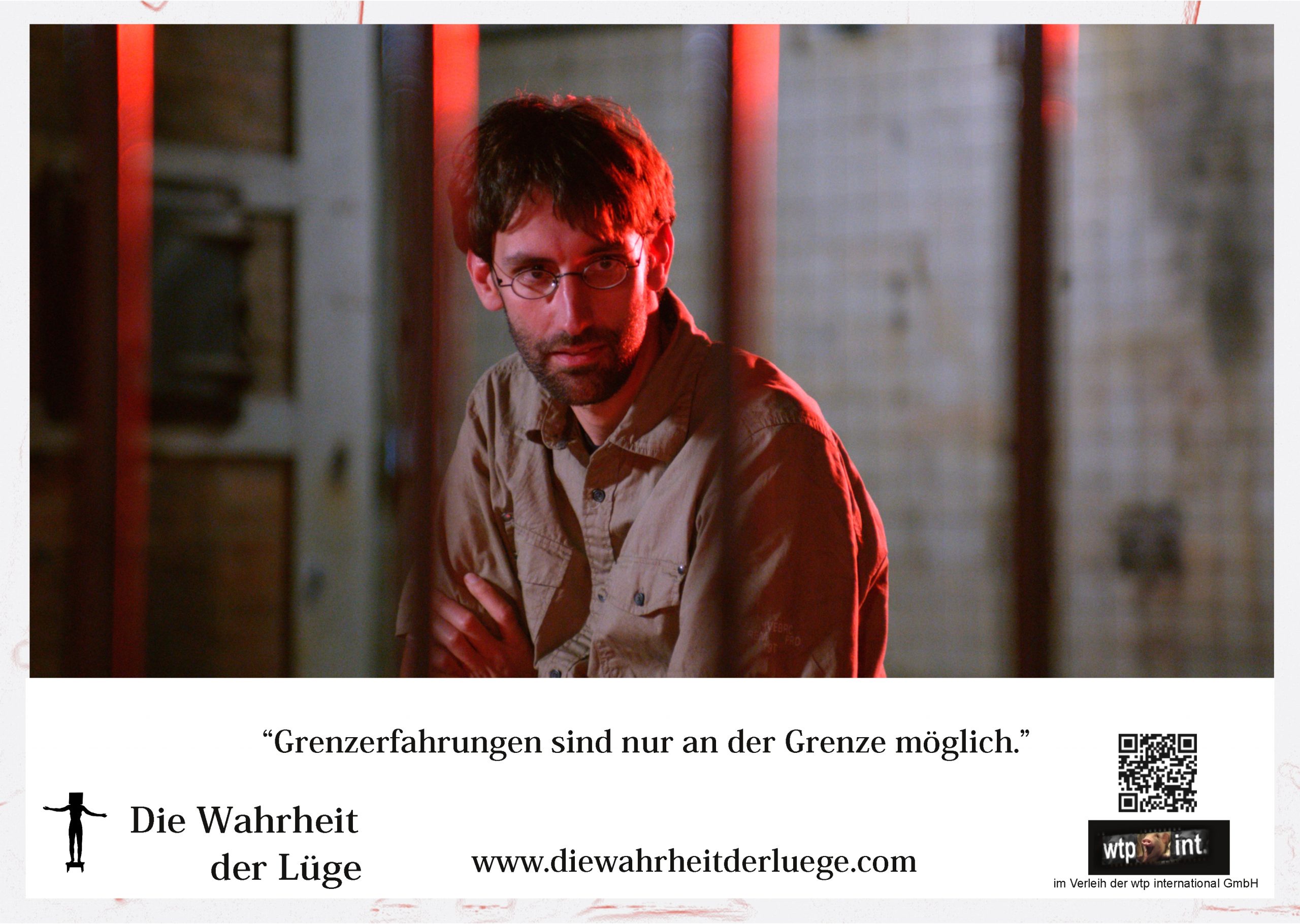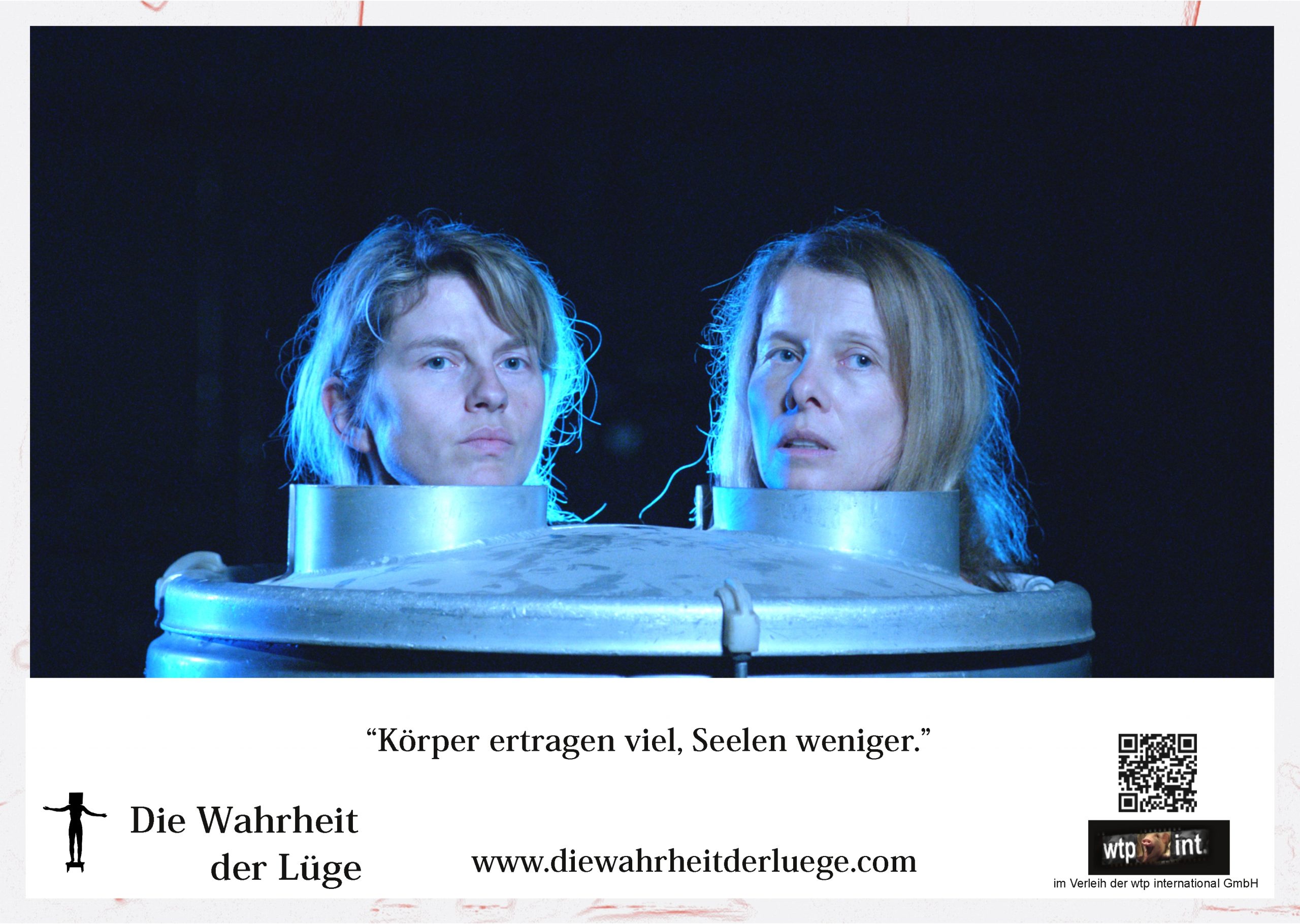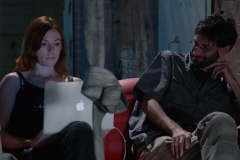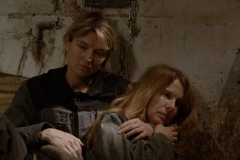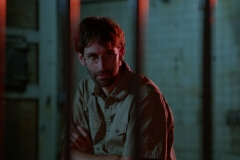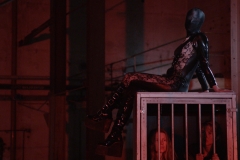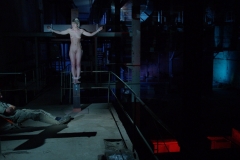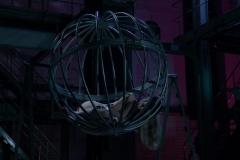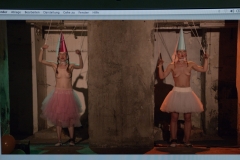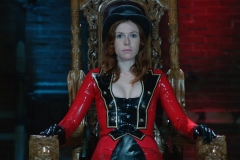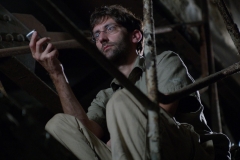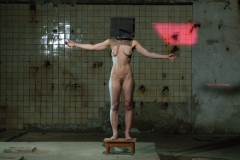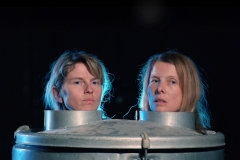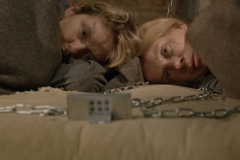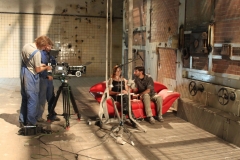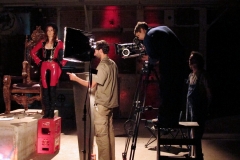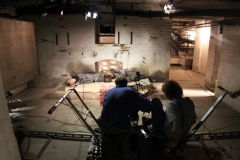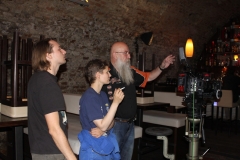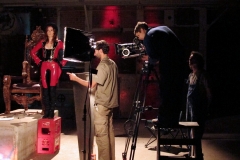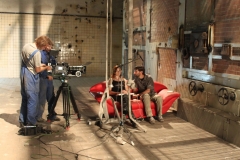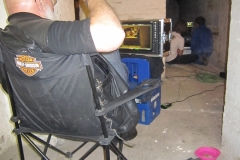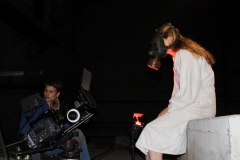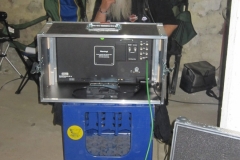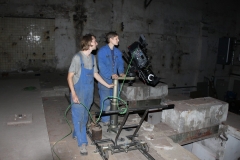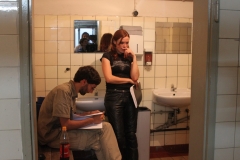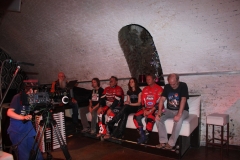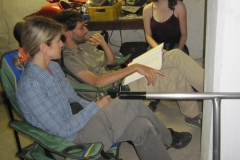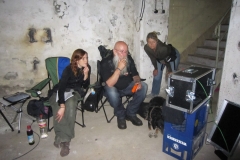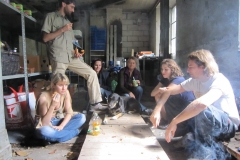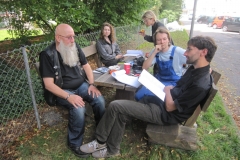
Mit dem Laden des Videos akzeptieren Sie die Datenschutzerklärung von YouTube.
Mehr erfahren

THE TRUTH OF LIE
a film by Roland Reber
Germany 2011, psycho-thriller, 98 min, rated 16
- „Masterpiece. A project, which discribes the most intensive psychological intimate play of the last years“. (Deadline film magazine)
- “‘The truth of lie’ is sometimes sensitive, sometimes shockingly merciless but always relentlessly unconventional… A kind of ‘master puzzle‘ of a movie.“ (movieworlds.com)
- „The truth of lie“ impresses the audience in an erotic-aesthetical aspect.“ (Filmecho)
since 27th of july 2012 available on DVD & Blu-ray (in German with English subtitles)
German premiere: International Hof Film Festival 2011
theatrical release: 29th of march 2012
with Christoph Baumann, Marina Anna Eich, Julia Jaschke, Antje Nikola Mönning
DoP and editing: Mira Gittner. light design and camera assistant: Steffen Neder
music: Wolfgang Edelmayer. line producer: Marina Anna Eich
producer: Patricia Koch, Marina Anna Eich, Roland Reber, Antje Nikola Mönning
written and directed: Roland Reber. production, sales & distribution: wtp international GmbH
“What’s true and what’s not depends on the viewpoint.”
In an underground labyrinth, a WRITER (Christoph Baumann) is holding two women captive: the COURAGEOUS ONE (Marina Anna Eich) and the HESITANT ONE (Julia Jaschke). He wants to make them experience their outer limits, lead them to the “top”. He tortures them in body and soul. However, his methods are not leading to the desired result. His PUBLISHER (Antje Nikola Mönning), a shady woman, is pushing him further and further. The torments are getting more and more bizarre. Rules are put in place – just to be immediately broken. It looks like a battle against time as a stop watch continously counts down towards zero. What will happen then?
The writer says: “Experiencing one’s outer limits is only possible once you are on the limit. But where is the boundary and where’s the borderguard?”
Nothing is as it seems.
STATEMENT OF THE DIRECTOR
“It was never about a real dipiction of two captive women but about the metaphor of the prison we call life.“ (Roland Reber)
Poem from the film:
“I don’t believe in you but still I keep on searching. I know for sure you don’t exist but still you are in me. I dare to say I won’t find you as you do not exist. But the search keeps me alive so I’m looking for you as long as I live.” by Roland Reber
Like all productions of wtp international GmbH, THE TRUTH OF LIE was produced without public funding and with the creativity and commitment of everyone involved. A small team with various duties and responsibilities within the cast.
Shot on the Arri Alexa camera THE TRUTH OF LIE will be shown digitally from the 29th march 2012 in german cinemas and is available on DVD and BluRay since 27th july 2012.
The special thing about wtp international film production is their uncompromising dedication to film welding the film production team tightly together since 7 feature films. Additionally to this it’s wtp’s way of producing – with script, production, editing, sales, distribution, dvd-label, public relation all made by the same team – consequently refusing public funding money and co-production with TV stations to keep creative freedom.
FROM THE IDEA TO THE FILM
„First there was a location. Some month ago I saw a disused factory hall and wanted to use this as setting for a film. So the only thing that existed was a location and an idea for a story – a man is holding two women captive, but a finished script didn’t existed yet. I just knew it should be a very claustrophopic film, therefore we would only work with a very small production team and a small cast. After a very relaxed afternoon of brainstorming with the main actresses and actor we wrote a script and then started filming.” (Roland Reber)
After 14 days of filming on the Arri Alexa camera, 16 hours of material, 40 cheeseburger, 1 Box of PowerGel, too little sleep and huge amounts of commitment of all people involved we finally completed the film in october 2011, after 36 days of post production, and presented it at the ‘Hofer Filmtage’.
SPECIAL WORKING METHOD
„The special working method of wtp international allows focusing on the creative process. I develop the script, make the directing of the actors on set. Mira Gittner is responsible for the pictures and the editing. After the last shooting day Mira shuts herself away in her editing studio and doesn’t leave until the work is done. I see the film once the rough cut is ready. This division of responsibilities has been proved with six feature films and will continue for the next films.” (Roland Reber)
To view filmmaking as a creative adventure is typical for Roland Reber and the wtp-team. With a small group and multiple tasks for each one of them the results is an integrated art work to which everyone involved has a creative relationship.
Therefore Roland Reber is not only director, but also author and co-producer, Antje Nikola Mönning playing the PUBLISHER also co-produced and took on the role of the director’s assistance, Marina Anna Eich playing the role of the COURAGEOUS ONE also took on the organisation of the production and is responsible for the sales, distribution and public relations of the film. Mira Gittner was responsible for the camera and the editing. This approach also leaves lots of space for spontaneous ideas during filming. For example the ideas for the torture scenes only developed on set. The dialogues were in the script but the tortures were only described in there as ‘diverse tortures’. On set the actors were able to translate these ‘diverse tortures’ together with the team into actual scenes. So everyone could insert their own ideas and creativity.
„This time there was a script from the very beginning, keeping in mind that all my scripts are just a basis for the actors to develop their own roles. And like with the WRITER in the film, a script is always just a theoretical matter, which in my opinion shouldn’t be too rigid, so one has the chance during filming to leave the story some free reign. And sometimes the theoretical script translates completely different. So during filming we changed together the ending as it worked out to be more coherent in its current form. Do I write the book or am I being written?“ (Roland Reber)
LOCATIONS
In THE TRUTH OF LIE we put lots of effort into filming in original locations to show the authentic character. The disused factory hall and the underground labyrinth were ideal for capturing the claustrophobic emotion and the confusion of the changing realities. On the one hand very real in the women’s prison, on the other hand in the depth of the factorty hall, in which everyone on his own just looks lost. In this locations far away from the daily distractions, the protagonists had the chance to focus their attention onto themselves and recognise the inner structures of their own spirit.
„A filmset is always just a backdrop, which lacks real live. And it is and always will be just an artificial space. We wanted to film at locations, which allow the participants to feel their authenticity. And as in this story the borders between truth and lie are shifting – so are the locations. Starting underground in the women’s prison, a cellar with lots of paths leading away, i.e. lots of possibilities, every act is leading higher and higher into the factory hall with its scuffolding, leading up towards the “top”, only interrupted by bar scenes, the outside world.” (Mira Gittner)
CAST
THE WRITER Christoph Baumann
THE COURAGEOUS ONE Marina Anna Eich
THE HESITANT ONE Julia Jaschke
THE PUBLISHER Antje Nikola Mönning
CREW
written & directed Roland Reber
producers Patricia Koch, Marina Anna Eich, Roland Reber, Antje Nikola Mönning
line producer Marina Anna Eich
assistant to director Antje Nikola Mönning
DoP and editing Mira Gittner
light design /camera assistant Steffen Neder
music Wolfgang Edelmayer, Eric Zwang-Eriksson
production assistant Claire Plaut, Ute Meisenheimer
production│sales│distribution wtp international GmbH
year of production 2011
shooting time August / September 2011
post production September / October 2011
locations Augsburg, Landsberg/Lech
International Hof Film Festival, Oct 2011
International Film Festival of India, Nov 2011
International Chennai Film Festival, India, Dec 2011
Pune International Film Festival, India, Jan 2012
Fantasporto International Film Festival, Feb 2012
Sitges International Film Festival, Oct 2012
Cairo International Film Festival, Egypt, Dec 2012
Fetish Film Festival, Kiel, Germany, Spt 2012
International Film Festival of Fiji, July 2013
“The films of Roland Reber and his small committed team are discoveries of an independent cinema which are rare in the international film community.”
(Feuilleton, Süddeutsche Zeitung, entire article)
„Director Roland Reber caused a sensation with its new work ‚The truth of lie‘. A disturbing confusion of emotions!” (3sat.de about International Hof Film Festival 2011)
„Masterpiece. A project, which discribes the most intensive psychological intimate play of the last years“. (Deadline filmmagazin, entire article)
„‚The truth of lie‘ is nightmarish and fascinating. The team around Roland Reber succeeded in making an atmospheric and close narrated thriller, somewhere between the wild charme of the German legend of author’s films Klaus Lemke and the dark sensuality of the French Horrorfilm “Martyrs”.“ (Filmstarts.de)
„The truth of lie“ impresses the audience in an erotic-aesthetical aspect.“ (Filmecho/Filmwoche)
“The Truth of Lie” is marked out by it’s minimalism and directness.The nightmarish atmosphere the viewer feels is created by the convincing actors as well as by the minimalistic setting.” (filmreporter.de)
„This pearl of a weird but wonderful art house movie focusses, in a minimalistic way, on the perfect treachery.” (digitalvd.de, Jean Lüdeke)
“‘The truth of lie’ is sometimes sensitive, sometimes shockingly merciless but always relentlessly unconventional… A kind of ‘master puzzle‘ of a movie.“ (movieworlds.com)
“Made completely without using any government funding, they have once again created – with very limited resources a work that will most definitely ensure controversial discussions.” (cinetastic.de)
„wtp has arrived on the big screen!… Shedding light onto human abyss is one of Roland Rebers great features. He just changed his style a bit.“
(filmjournalisten.de)
“Thus, the result are moments in the new production ‘The Truth of Lie’ of true cinematic magic.” (fluter.de)
“Long live Independent cinema!” (thirstyrabbit.net, entire article)
ROLAND REBER (director, scriptwriter, producer)
What is your main topic of the film?
Like all our movies this film has several levels. A superficial level: a man holds two women captive and is pushed further and further by his publisher till he himself ends up in the dungeon. A second level: The film is about being unconsidered and not thinking about consequences. The women are acting without considering consequences as they simply agree to the experiment without thinking about implications. The writer is unconsidered as he neither has prepared himself nor the experiment: he doesn’t know what “reaching the top” actually means. Only the publisher is not unconsidered, this would be again a level beneath. A deeper level would be: Id, Ego and Super Ego. The freudian model. The writer and the two prisoners are representing one person and the publisher signifies life itself. Life, which keeps on testing them, lets them fail and dissolves concepts. Beneath those there are some more levels but I want the viewers to find out for themselves.
You have a special method of making films. What does your working method looks like?
It is an assumption that I would have a special method. My function is simple: Let it be! Meaning I am leaving it up to the actors, who I see as artists and not as servants, to define their roles. I direct softly, discuss a lot and get involved with the actors (let myself in with the actors), who finally form the bigger part of the film People always talk about a Roland Reber film – actually against my will, which I want to emphasize once again – as in truth it’s always a mutual work: Mira Gittner is doing lots: camera, editing and often she also plays a main character. Antje Nikola Mönning acts and is at the same time my (director’s) assistant. Marina Anna Eich is head of sales & distribution as well as press agent. Everyone of us has several tasks. Additionally there are Patricia Koch, Ute Meisenheimer and Claire Plaut. So it’s a mutual work. The films are wtp-films.
You are making films without government funding. Is there a special reason behind that?
Yes. To take government film funding is like putting yourself in the position of the two women. You are getting money for a specific time and specific projects but you are totally depended on these sadists. Then you add a broadcaster, like the publisher, who drives everyone into misery. In the end there is nothing left from your film except the title and that you are allowed to call yourself filmproduction company. This is a consciously created dependency, in which every young, pimpled, unemployed wanna-be, whos father is sitting in the supervisory board, will be named editor and has the power to decide, completely ignorant of the situation, what’s happening, who will be casted, which scenes are to be deleted and in which festivals to participate. Government Film funding? No thanks.
How did you put the torture scenes into action?
With lots of fun, enjoyment and high spirits. You see, it’s all just a movie. If you have a look at parts of the making-of you will see that it actually wasn’t as cruel as it may look. It was good fun, I enjoyed it.
Why are the women naked during the torture scenes?
He uncovers them. In soul, spirit and body.
What does the title mean?
In every lie lies a bit of truth and in every truth lies a bit of lie. This, I took directly out of life. What actually is truth? What is the top? These are really important questions everyone should ask themselves. Everyday we are informed by broadcasting station, print media and internet: this is the truth, this is what we uncovered, this is what we need to make public. But what is really true, what is fiction, what is manipulation. In every lie lies a bit of truth and in every truth lies a bit of lie.
What’s your next project?
As every year, this will be decided at the Cannes Filmfestival. This is a ritual since we made the film “24/7 The Passion of Life” which actually was the first one to be decided there – purely accidental though. Since then, it’s always in Cannes when we make up our mind about the next project. If I have to guess right now, I think it will be “Big parking No.7”, a film about sex on public parking spaces.
INTERVIEW WITH CHRISTOPH BAUMANN (role: the WRITER)
Why did this script attract you?
The writer’s character and the fresh narrative style of the story: A man is holding two women hostage and yet nothing is as it seems at first: Why do the figures seem so artificial? Why are they not acting? What goals do the characters have? For me, this script was a concentrated form of “The Dark Side…”, much denser, more claustrophobic, more exciting and far more merciless.
How did you get on working with Roland Reber and the team with their special working method?
As I have previously been involved in two of their productions (”The Dark Side…” and “24/7…“) I was already familiar with their working ethics and wasn’t surprised by their neat, intense and close special working method. What’s most “special” about it, is not only the extensive talks about the script, the motivation of the characters and their associations which dominated the screen tests, but also the pauses. These two factors helped me to dive deep into the thoughts and emotions of the writer.
What was so special about the role of the writer? Were there parallels to your own life?
The writer is getting wrapped up in an idea without a definite goal – for me a very comprehensible role. He has thought it through so nicely – devotingly planning the tortures, the humiliations, engaging his cerebral cinema – and then in the end he has to realize that his great plan was meant to fail from the very beginning. That was not due to a fault in the planning or by the women but by him.
What is for you the main topic of the film?
Yes, just make a plan, just be a big light! And then make up a second plan, both won’t work Cause for this life the man is not bad enough: but his longing for higher goals, is a nice touch.
Are there any anecdotes from filming?
I was very excited to find out how the torture method called “waterboarding” would work – to all our surprise (including Marina Anna Eich) it worked so well it probably gave Mira Gittner some headache editing it.
Were there difficult scenes? Did you have a favourite scene?
The ultimate turn around of the writer’s character happened in the last third of the film (the “sofa scene”) which was the most difficult but at the same time my favourite scene. I can see here the most remarkable dissection of the figure and at the same time the beginning of his decline.
Have you experienced your outer limits yourself?
No, I haven’t experienced my outer limits but I was surprised how strong the “cerebral cinema” can differ from reality. Scenes, that you have thought through intensly whilst reading the script, got a completely new meaning when acting. Especially with a topic in which the imagination is the decisive driving force behind it.
INTERVIEW WITH MARINA ANNA EICH (role: the COURAGEOUS ONE, producer, distributor and PR)
What attracted you to the role?
The character is very calm and steady and tries to act in a considered way, in this very difficult situation, of which the outcome is uncertain and which could end up in death at any time. A character which isn’t at all corresponding to mine. In such a life threatening situation I would rather slip into Hysteria. But this contrast attracted me and was also challenging. Both of the imprisoned women live through different tortures, naked, so that the author, as he says, can lead them to the top. But nudity is not related to sexuality here. In this case it is a symbol for the purity of the soul, an expression of clarity, pureness, the unclouded. So to say the preparation for an immaculate spirit, which the author is aspiring for both.
What is the message of the film?
For me, the movie is a symbol. A metaphor for the fusion of this world and the afterworld. Both of the prisoners stand for two human opposites. The publisher symbolizes destiny, which intervenes with advices in a tough and ruthless but supporting way and holds the reins. The author is a mix and stands between this world and the afterworld, as a kind of mediator who wants to bring the two prisoners on their way towards self-awareness, give them a push towards a way to “salvation”. Because of the intense dealing with the issue also the author gets into human self-doubts, that finally lead himself more and more towards self-awareness. Therefore the film has something very religious for me.
Are there favorite, or particularly difficult scenes?
In the scene at the cross, the author tries to give an understanding of the terms of “trust” and “truth” to the courageous one, by letting her hang naked at the cross for hours. It is the determining scene in which one also comes to see the vulnerable side of the courageous one. She is about to be broken. An inner fight: not to lose her countenance, and at the same time being extremely humiliated and to fear for her life. This fight was one of the most difficult scenes for me.
Did you ever make a borderline experience?
The idea to use “water boarding” as one of the tortures came from us actors. Because of the gag reflex one psychologically gets the impression of the threat to drown immediately, in no more than a few seconds. I wouldn’t have thought that the fear for death would come so quickly. Now I can understand why this kind of torture leads to the desired result in less than a minute. I had another borderline experience waking up from a general anesthesia. I had the impression to suffocate because my respiratory tract was extremely dry and experienced a fear of death.
ANTJE NIKOLA MÖNNING (role: the PUBLISHER, producer)
What was the reason for you to take on the role of the publisher?
It is great that I have the opportunity as actress to explore so many different facets of the human mind and that I can satisfy this through my acting.
For me it’s important to surprise myself and the viewers, again and again, with every new role.
That was the reason, that after having played the “lying, horny bitch” Lucy in “angels with dirty wings”, to go for a completely different role.
My character in “The truth of Lie”, the publisher, is also extreme, but in another way:
she is without compromise, shady and has a clear target in mind. She follows it without consideration towards human feelings and sits on the edge of legality.
For me, in this film, she is the only one who is prepared to go to her limits.
And at the same time she is the borderguard who ultimately decides who is allowed to go over the limit and who isn’t.
In contrast to Lucy, who didn’t know what she wanted and was driven by the others, the publisher is the gamemaster. That’s what intrigued me so much about playing this role.

